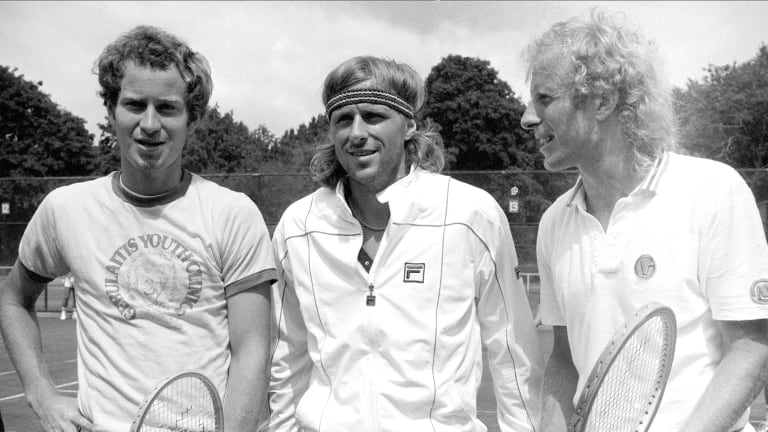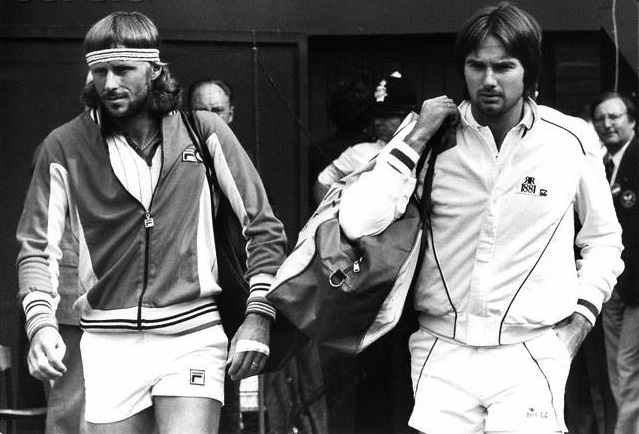In the annals of tennis history, few matches are as memorable as the 1977 Wimbledon final between Jimmy Connors and Bjorn Borg. The contest was more than just a clash of titans—it was a showcase of resilience, mental fortitude, and the razor-thin margins that separate victory from defeat.
Here's ads banner inside a post
Jimmy Connors, a fiery competitor and one of the sport’s most iconic figures, has achieved extraordinary success during his illustrious career. Yet, the heartbreak of his loss to Bjorn Borg in that Wimbledon final still lingers, a chapter in his career he admits he will never forget.

A Final for the Ages
The 1977 Wimbledon Championship was filled with intrigue. Rising star John McEnroe made a sensational debut, reaching the semifinals before falling to Connors. Meanwhile, tennis legend Rod Laver, a four-time Wimbledon champion, made a much-anticipated appearance but bowed out early.
Here's ads banner inside a post
In the end, it was the top seeds—Connors and Borg—who advanced to the final. The stage was set for a thrilling encounter, and the match did not disappoint. Borg claimed victory in an epic five-set duel, winning 3-6, 6-2, 6-1, 5-7, 6-4.
The Swedish maestro’s blend of poise and consistency ultimately outlasted Connors’ aggressive baseline play. However, as Connors has revealed in hindsight, the match’s outcome hinged on a series of fleeting moments.

Here's ads banner inside a post
The Turning Point
Reflecting on the match during a recent episode of his podcast, Advantage Connors, Connors shared insights into what he believed was the critical turning point. Asked by his son, Brett, which match he would revisit if given the chance, Connors unequivocally named the 1977 Wimbledon final.
“All I needed was 10 more minutes,” Connors said. “I came back from love-40 in the fifth set to make it 4-all, and then suddenly, it collapsed. I lost eight of the next nine points. That’s all it took—just 10 more minutes, and things could’ve been different.”
Connors recounted an incident during that pivotal moment where a spectator’s comment distracted him, leading to a lapse in focus.
“Someone from the stands said something. I’ll never forget it,” Connors said. “I turned around and responded, and that was when it all went downhill. I played a couple of loose points and let it get to me. Looking back, I wish I could’ve just tuned it out.”
Mental Game and Focus
Known for his fiery temperament, Connors was often lauded for his mental toughness on the court. Yet, the 1977 Wimbledon final revealed even the most seasoned athletes can be vulnerable to lapses in concentration.
“I let someone get into my head, and that’s something I was always so good at avoiding,” Connors admitted. “That day, I didn’t. It may have cost me Wimbledon.”
Connors emphasized how small moments, like a single voice in the crowd, can significantly influence the outcome of high-stakes matches. “A sound, a call, a comment—anything can change the course of a match. That day, it went against me,” he said.
A Rivalry for the Ages
Connors and Borg’s rivalry epitomized the golden era of tennis. While Borg won 15 of their 23 encounters, their matches were always fiercely competitive. Borg’s calm demeanor and precision on the court contrasted with Connors’ aggressive style and fiery personality, creating captivating showdowns.
In Grand Slam achievements, Borg’s 11 titles surpass Connors’ eight. However, Connors’ longevity and consistency over his career remain unparalleled, with his remarkable 1,274 match wins still standing as a record.
The 1977 Wimbledon final remains a defining chapter in their rivalry. Borg’s triumph marked one of his six Wimbledon titles, cementing his legacy as a grass-court maestro. Meanwhile, for Connors, the loss served as both a lesson and a haunting memory.
Lessons Learned
Despite the heartbreak, Connors views the loss as a crucial learning experience. He acknowledged that the distraction cost him a chance at glory, but it also motivated him to refine his mental game for future matches.
“I moved past it quickly,” Connors said. “I made sure it never happened again. It taught me to stay laser-focused, no matter what’s happening around me.”
Connors’ ability to channel disappointment into growth was a hallmark of his career. He bounced back to capture five US Open titles, two Wimbledon titles, and an Australian Open crown, cementing his place among tennis’s all-time greats.
Enduring Legacy
While Borg retired at just 26, Connors continued competing well into his 40s, a testament to his unparalleled passion and resilience. Both players have remained influential figures in tennis, their rivalry serving as a reminder of the sport’s enduring appeal.
Their legacy extends beyond their on-court achievements. Connors’ candid reflections on his career, including his memorable clashes with Borg, offer invaluable insights for aspiring players and fans alike.
As Connors puts it, “Tennis isn’t just about winning or losing. It’s about learning, evolving, and pushing yourself to be better every time you step on the court.”

